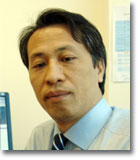Alfaisal University faculty members continue to demonstrate the quality and excellence of their work with the recent announcement of the results of the March 2011 KACST Strategic Grants Competition. Three out of five proposals were recommended for funding giving a success rate of 60%. The projects cover three strategic areas of importance to the Kingdom: Renewable Energy, Cardiovascular Disease, and Nanotechnology.
Dr. Zhao Yong, Associate Professor of Mechanical Engineering, has a highly recommended project entitled “Advanced study of aerodynamics and fluid-structure interaction of wind turbines”. The joint computational and experimental research is expected to lead to a better understanding of the unsteady aerodynamics and fluid-structure interactions associated wind turbine flows. The project will produce computational tools that can be used by wind turbine designers to design better new generation wind turbines with faster speed. These new generation wind turbines will have a strong positive impact on long-term climate changes, as the efficient use of renewable energy technologies, such as wind turbines, will help reduce human’s reliance on fossil fuels. Wind energy has been identified by KACST as a strategic research development area. One of the expected outcomes of this research is to set up a technical resources centre for product development, consultancy, testing and verification, organization of workshop, seminar and conferences, and promotion of investment in the application of wind turbines, in particularly in combined wind energy and desalination plants in KSA.
 In addition, Dr. Peter Kvietys, a Professor in the College of Medicine, also has a highly recommended project; Role of T cells in LPS-induced lung inflammation and dysfunction. Acute lung injury (ALI) and the more severe acute respiratory distress syndrome (ARDS) is a clinical entity characterized by pulmonary edema and systemic hypoxemia. The underlying cause is believed to be a robust inflammatory state which results in PMN-mediated injury to the capillary-alveolar unit. The syndrome requires extensive stays in an ICU (intensive care unit) with an unacceptably high mortality rate (40 -60%). Despite extensive basic research and resultant clinical trials, treatment remains primarily supportive. The role of adaptive immune factors in the pathogenesis of this inflammatory syndrome has not been previously addressed. The insights gained from the studies should provide a rational basis for the development of novel therapeutic regimens to treat ALI/ARDS. With respect to advancing the biomedical research environment in Saudi Arabia, the studies will provide a fertile training environment for graduate and postdoctoral students.
In addition, Dr. Peter Kvietys, a Professor in the College of Medicine, also has a highly recommended project; Role of T cells in LPS-induced lung inflammation and dysfunction. Acute lung injury (ALI) and the more severe acute respiratory distress syndrome (ARDS) is a clinical entity characterized by pulmonary edema and systemic hypoxemia. The underlying cause is believed to be a robust inflammatory state which results in PMN-mediated injury to the capillary-alveolar unit. The syndrome requires extensive stays in an ICU (intensive care unit) with an unacceptably high mortality rate (40 -60%). Despite extensive basic research and resultant clinical trials, treatment remains primarily supportive. The role of adaptive immune factors in the pathogenesis of this inflammatory syndrome has not been previously addressed. The insights gained from the studies should provide a rational basis for the development of novel therapeutic regimens to treat ALI/ARDS. With respect to advancing the biomedical research environment in Saudi Arabia, the studies will provide a fertile training environment for graduate and postdoctoral students.
 Finally, Dr. Abdulmajeed A. Mohamad, a Professor in the Mechanical Engineering Department. has a recommended project entitled: Nanotech for Energy, Heat Transfer Control. Nanotechnology in the near future is expected to revolutionize almost all aspects of our lives. The international race to better understand, manufacture, and operate, nano devices for the engineering and medical industry will dictate the location of the next major economic hub. An essential part of such an understanding is the dynamics CNTs in aqueous environments. The approved research project will provide a central framework, and a practical computational tool that will shed light on potential additional enhancements to water flow in CNTs. Such a tool will also provide a foundation, on which future research studies can be built. The success of this project will provide the Kingdom with cutting edge scientific modelling techniques, and will project it onto the world stage of computational modelling of Nanofluidics.
Finally, Dr. Abdulmajeed A. Mohamad, a Professor in the Mechanical Engineering Department. has a recommended project entitled: Nanotech for Energy, Heat Transfer Control. Nanotechnology in the near future is expected to revolutionize almost all aspects of our lives. The international race to better understand, manufacture, and operate, nano devices for the engineering and medical industry will dictate the location of the next major economic hub. An essential part of such an understanding is the dynamics CNTs in aqueous environments. The approved research project will provide a central framework, and a practical computational tool that will shed light on potential additional enhancements to water flow in CNTs. Such a tool will also provide a foundation, on which future research studies can be built. The success of this project will provide the Kingdom with cutting edge scientific modelling techniques, and will project it onto the world stage of computational modelling of Nanofluidics.














